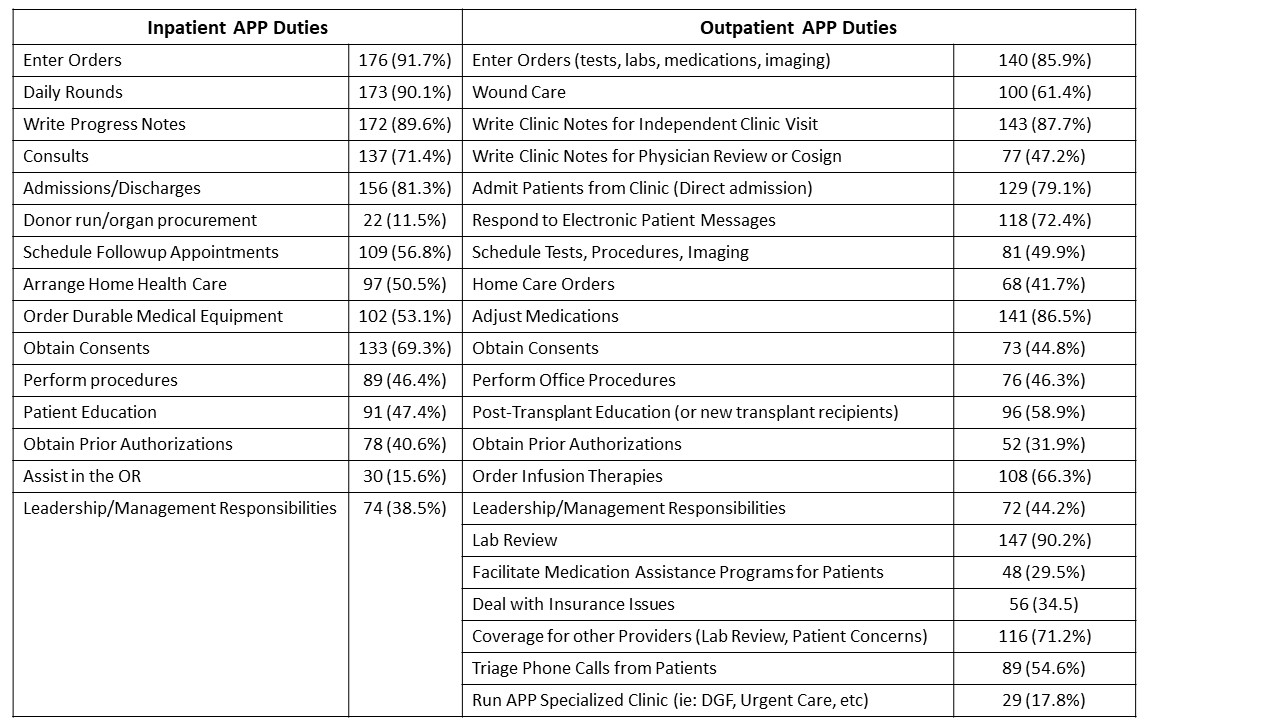Results of the APP Practice Survey: Do APPs Practice at the Top of Their Scope of Practice?
1Northwestern University, Chicago, IL, 2University of California-San Francisco, San Francisco, CA, 3University of Wisconsin, Madison, WI, 4Medstar Georgetown University, Annandale, VA, 5University of Maryland, Baltimore, MD, 6Erie County Medical Center, Grand Island, NY, 7Swedish Organ Transplant, Seattle, WA, 8Rush University, Chicago, IL, 9University of Alabama - Huntsville, Huntsville, AL, 10University of Colorado-Denver, Denver, CO
Meeting: 2021 American Transplant Congress
Abstract number: 437
Keywords: N/A
Topic: Administrative » Quality Assurance Process Improvement & Regulatory Issues
Session Information
Session Name: Quality Assurance Process Improvement & Regulatory Issues
Session Type: Poster Video Chat
Date: Monday, June 7, 2021
Session Time: 7:30pm-8:30pm
 Presentation Time: 7:30pm-7:40pm
Presentation Time: 7:30pm-7:40pm
Location: Virtual
*Purpose: Transplant centers employ Advance Practice Providers (APPs) in response to physician trainee work hour restrictions and to increase patient access to transplant care. APPs have completed advance training and certification in order to manage medical conditions in inpatient and outpatient settings.
*Methods: Questions to determine if APPs are practicing at the top of their scope of practice were included in the AST APP Practice survey. Top of scope of practice is defined as delivering healthcare to the fullest extent of the APP license as allowed by state laws and regulations.
*Results: APPs (n-253) from 32 states and DC completed the survey. 26.2% of APPs were not working at the top of their scope of practice. Reasons include inability to perform procedures, inadequate training, restrictive hospital protocols. 8.6% function as a scribe, 29.7% were expected to function as a coordinator. Though 92.9% of inpatient APPs worked with transplant coordinators, they schedule follow up appointments (56.8%), arrange home health care (50.5%), obtain prior authorizations (40.6%). 95.5% of outpatient APPs worked with transplant coordinators, but still schedule tests and procedures (49.9%), obtain prior authorizations (31.9%), deal with insurance issues (34.5%), and facilitate medication assistance programs for patients (29.5%). 87.7% of outpatient APPs conduct independent clinic visits, 47.2% write clinic notes for physician review or cosign as part of their job. 17.8% run specialized APP clinics like transplant urgent care and delayed graft function clinics. APP duties are in table 1.
*Conclusions: With the increasing burden of healthcare costs, every team member should practice to their full potential. With appropriate training and experience, APPs can manage highly complex patients and perform a wide range of procedures. A significant percentage currently perform duties more appropriately delegated to nurse coordinators or case managers. By optimizing APPs’ role, time spent performing these tasks can be allocated to seeing more patients, thus improving patient access to health care as well as APP job satisfaction and retention.
To cite this abstract in AMA style:
Domingo H, Krieger D, Muth B, Frank A, Borth A, McDade H, Paolini K, Mayfield A, Siegfired M, Yoo J, Hoy H, McCormick N. Results of the APP Practice Survey: Do APPs Practice at the Top of Their Scope of Practice? [abstract]. Am J Transplant. 2021; 21 (suppl 3). https://atcmeetingabstracts.com/abstract/results-of-the-app-practice-survey-do-apps-practice-at-the-top-of-their-scope-of-practice/. Accessed February 14, 2026.« Back to 2021 American Transplant Congress

